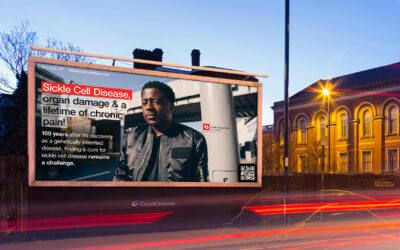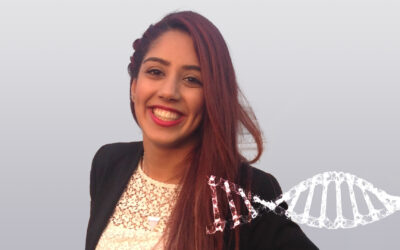This is What Sickle Cell Looks Like: From a Voice in the SCD Community
Advocate, entrepreneur and voice actor Maria Gbeleyi speaks on the importance of being vocal about the SCD experience – no matter how unique, challenging or complicated it is.
For Maria Gbeleyi, ensuring that every aspect of the Sickle Cell Disease (SCD) patient journey experience is accounted for is a matter of life and death.
In her case, it certainly was.
Some years ago, voice actor, healthcare professional and marketing entrepreneur Maria found herself on the brink of death after a severe vaso-occlusive crisis (VOC). Her medical team told her family to prepare for the worst and that the most they could do to support her was to make sure she was as comfortable as possible. Throughout this particular VOC, Maria’s condition fluctuated greatly. Her clinicians worked hard to manage many of the complications that arose throughout her crisis. Thankfully, they did. Reflecting on this time in her life, Maria wonders if it was by chance, or perhaps a miracle, that she was able to survive:
“I had never seen such worry or concern in my doctor’s eyes. To not only hear that there wasn’t anything more they could do for me, but to also visibly see fear on their faces, was one of the hardest moments in my life. We didn’t know if I would make it, but I did. And I am so grateful I came through it, especially in terms of the way it has shaped me since.”
Maria’s condition was made more complex due to the fact that she also had an undiagnosed, underlying condition: fibromyalgia. Like SCD, it is a non-curable chronic disease that presents in extreme pain for patients. Her co-occurring and undiagnosed condition made Maria’s reality ever more complex and changeable. As a result of her fibromyalgia worsening her crisis, she has had to exercise caution and patience. As a result, not one day has ever been the same, and she doubts that it ever will be:
“Our bodies and systems change so much throughout life, especially for people with a genetic blood disorder like SCD. At this stage in my life, I am trying to use my experience to emphasise how changeable the condition is – every patient goes through a unique journey based on who we are and our genetic makeup.”
“That’s where the challenge is for researchers. SCD appears differently in every single patient, and our conditions will change as we enter different phases of our lives. Understanding how SCD develops and changes as we do is one of the biggest challenges that we need them to tackle.”
Maria echoes the thoughts and feelings of SCD patients with multiple chronic disease diagnoses. Many of the individuals she connects with suffer from a plethora of different conditions, from high risk of end-organ damage, pulmonary and renal disorders, and more. Like she has in the past, many patients with comorbidities encounter challenges in communicating their condition. Compounded with SCD, a highly nuanced and complicated disease in and of itself, speaking on their other health issues can be difficult.
She believes that arming the individual and community with granular, day-to-day information on their condition, SCD and beyond will determine whether they experience positive health outcomes. To date, Maria has used Sanius Health’s platform and technology to help monitor her sleep, water intake and activity, which as not only helped to manage her health but also remain productive throughout the week:
“The tools Sanius Health provide, especially the wearable device and platform, showed me how little sleep I was getting and how my water intake has changed. I now know that when my quality of sleep changes, or when I drink less water, I will experience some pain.”
“This information has helped me plan my week as well. It’s a good reminder to structure my tasks according to what my body needs. I rest when I can see something will affect my pain scores, and I complete every day tasks when I’m feeling well. Above all, it lets me be gracious towards my condition – and what I know I can do every day.”
Although a matter of “choice”, Maria believes that patients need to align themselves with other members of the SCD community to educate themselves on how a deeper knowledge of their bodies could support their long-term health journeys:
“Of course, it depends on where you are in your journey and how ready you are. I think having some sort of network or platform that allows patients to share their experiences is important. We need a way to see how other patients, and their clinicians, have safely navigated many of the physical changes they have been through.
“For example, how has childbirth, pregnancy or even ageing affected their condition – have they had a positive experience or a negative one? What information or data can we look at to inform our own care decisions?”
To encourage others to share their experiences, Maria has made it her life’s mission to share her own with the community and beyond. She has, quite literally, lent her own voice to advocating for the SCD community, in order to encourage others to do the same. Through leading hospital support groups to volunteering at research centres, she strives to be vocal on how sharing stories and experiences will ultimately lead to more patient-centric research, care and better outcomes for all.
“What I’ve learned is that unless we start advocating for ourselves and each other, we will never see the care or research we need. I’ve learned that unless we share our experiences in the unique language we use to describe ourselves, those around us will miss the nuances of what it means to have SCD. This also applies to how we speak to healthcare professionals, researchers and those who support the SCD community.”
Every moment Maria spends advocating for SCD is in honour of patients before her who have made a significant impact on the community. Like her friend, who sadly passed away from a crisis, she is determined the make sure that every Sickle Cell voice is represented across the care continuum:
“If we work together, I am optimistic that we will see a better tomorrow for SCD patients. What it will take for us to get there is to make sure our voices are united – so that our clinicians and those working towards better SCD treatments understand everything that we go through.”
To raise awareness of SCD, we are working with advocacy leaders like Maria Gbeleyi and other members of the SCD community to make improved SCD care a reality.
Learn more about raising awareness around Sickle Cell Disease by accessing Sanius Health’s campaign site: https://whatscdlookslike.com/




